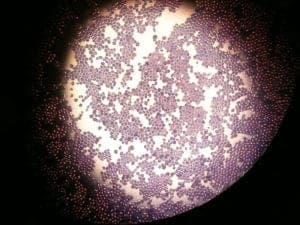Isolating an enzyme from baker’s yeast could help treat the most common form of childhood leukemia, new research reveals.
Also known as ALL, acute lymphoblastic leukemia accounts for 3 out of 4 childhood cancer cases in the United States. The disease begins by attacking lymphoblasts, which are immature white blood cells found in bone marrow.

Patients with ALL produce too many lymphoblasts, eliminating space for healthy white blood cells, red blood cells and platelets. The result is an increased susceptibility to anemia and infection.
The study, which isolates an L-asparaginase-like enzyme from Saccharomyces cerevisiae (baker’s yeast), was performed by scientists at the University of São Paulo’s School of Pharmaceutical Sciences and São Paulo State University’s Coastal Campus Bioscience Institute. The findings are published in the journal Scientific Reports.
“In this study we characterize the enzyme L-asparaginase from S. cerevisiae. The results show this protein can efficiently annihilate leukemia cells with low cytotoxicity to healthy cells,” said Gisele Monteiro, a professor at FCF-USP and co-author of the study.
Related: Elephants May Hold the Key to Curing Cancer
According to Monteiro, an enzyme like the L-asparaginase described in the study has been used to treat ALL for decades – but had been extracted from E. coli and E. chrysanthemi. Although this form of treatment is known for high remission rates, it also triggers mild to severe immune responses in up to 25 percent of patients.
The researchers used bioinformatics to reach their findings. They identified a gene in baker’s yeast called ASP1 responsible for producing a version of the enzyme with several advantages over those produced by E. coli and E. chrysanthemi.

“Our goal in this project wasn’t to produce the enzyme, but rather to find a new source of the biodrug in microorganisms for use in patients who develop resistance to the bacterial enzyme,” says study co-author Marcos Antonio de Oliveira of the Biosciences Institute at São Paulo State University.
Unlike bacteria, yeast is eukaryotic, explains first study author Munhoz Costa. That means it contains a membrane-covered nucleus consisting of genetic material, as is the case with human cells. Therefore, researchers believe that enzymes derived from yeast are less likely to trigger severe immune responses than bacterial enzymes.
Related: Melanoma Drug Halts Spread of Cancer Cells by 90 Percent in Trials
“We were able to obtain the recombinant protein,” notes Costa. “Finally, we evaluated its efficacy in vitro.”
Chemotherapy is often the first course of action for treating ALL. Other treatments include stem cell transplantation, radiation therapy and surgery.
Approximately 5,970 children and adults will be diagnosed with ALL in 2017 and nearly 1,440 deaths from the disease will occur.
Ultimately, researchers say that their findings show that yeast-derived L-asparaginase may be a safer, more effective treatment for ALL.
Lauren is a freelance writer and blogger from Chicago. When she’s not providing the latest in health and wellness, she can be found spending time with her family, baking delicious treats, or binge-watching the latest Netflix series.


![How To: ‘Fix’ Crepey Skin [Watch]](https://cdn.vitalupdates.com/wp-content/uploads/2017/05/bhmdad.png)












